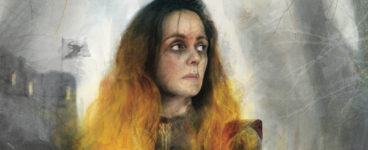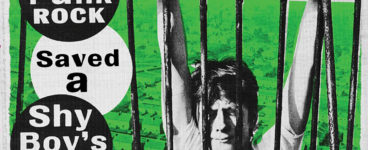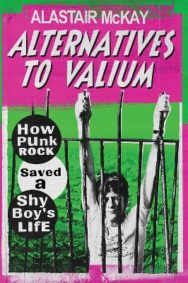‘The same school that told him he shouldn’t even sing in a chorus gave the careers advice that he was too intelligent to be a journalist and he should set his sights on becoming an engineer. Fortunately, he ignored their advice on both scores.’
Alistair McKay grew up in a fading Scottish seaside town; amenities were closing, there was little to do, but in punk, he found his voice. From there he embarked on a musical journey as an award-winning journalist, and a star-studded cast of cameos from Iggy Pop to Dolly Parton. David Robinson dives into Alternatives to Valium in this month’s review for BooksfromScotland.
Alternatives to Valium
By Alastair McKay
Published by Polygon
Sometime in 1981, Alastair McKay’s punk band The Commercials had a meeting where they worked out just how famous they intended to be. Not mega-famous, they decided. Just Echo and the Bunnymen famous.
Briefly, modest celebrity glittered on the horizon. Sounds magazine said they would be one of the bands to watch out for in 1982. Rough Trade Records didn’t sign them but were mildly encouraging. John Peel played their record once, though NME weren’t keen. And then … well, not very much. Opportunity never came knocking for The Commercials, or their tall, tuneless, cerebrotonic lead singer, and I’m glad it didn’t. If it had, McKay would probably have never got around to writing Alternatives to Valium.
In a Herculean attempt at objectivity, I shall attempt to disregard the fact that McKay is both a friend and former colleague. Actually, it’s easier than you might think. Because if his memoir proves one thing, it’s that you can sit next to someone for five years and hardly know them.
When we were both at The Scotsman at the start of the century, I’d interview writers, and he’d mostly interview musicians and film people. My job was easy, as usually writers are only too happy to unspool their thoughts into a tape recorder. Alastair’s interviewees, usually at the cooler end of the celebrity spectrum, were different. Or should that be diffident? Or difficult? At least that’s how I imagined most of them, people who didn’t really want you there in the first place and certainly didn’t want to give thoughtful answers to your tiresome questions. I wouldn’t have been any good with interviewees like that, but Alastair both was and is, and if his first book had consisted of his trademark witty waltzes with celebrity, I’d probably have enjoyed it well enough.
Alternatives to Valium, however, is better than that. It distils nostalgia so effectively that it doesn’t matter if you never shared any of it in the first place. Personally, for example, I’ve hardly anything in common with McKay: not fanzines, not North Berwick, not avid sweeps of Hot Licks, Phoenix, Ezy Ryder Record Exchange, Bruce’s and Hell on record-buying day trips to Edinburgh, not working on a community newspaper in Pilton or being a student in Aberdeen sharing a bedroom with three (!) other human beings. And certainly not punk rock, which (apart from The Stranglers) I was quite happy to let pass me by.
As a result – and whether it’s because I am a few years older than McKay, or because I mysteriously lost my record player in a blizzard of flat-moves when I was 21 – Alternatives to Valium has been, quite literally, an education. Only now, after lengthy Googling, do I know who Ari Up was, or Nils Lofgren, Patrik Fitzgerald, Ian Gomm, and Lionel Morton are. Apart from the opening to ‘Party Fears Two’, I’d never heard anything by Billy MacKenzie, yet even I can see how he blazed with charisma (and, in his interview with McKay, charm). The more I Googled and YouTubed, the more punk stopped being an offkey wail and started making some strange kind of sense. Why not rip it up and start again? Why not go all out for individuality? Why not in the words of Colin Vearncombe (oh, so Wonderful Life was him?) McKay chooses for his book’s epigraph ‘Write your own bloody Bibles’?
McKay comes to punk through the glam rock gateway drug of Slade (his first album, his first concert, and after it, his first Leith mugging). Along with punk comes the music press. His friend gets NME, he buys Sounds. ‘The writing is spiteful, urgent, cruel, cynical, petty, ill-informed, insecure, postmodern, pretentious, precious, too stupid, too clever; just like the voices inside my head.’ And already, his book has introduced us to some of those voices, albeit in a more comic register, the Weltschmerz of his teen punk band’s lyrics, the thoughts that bubble up behind chronic shyness, the idealism that makes him ‘perhaps North Berwick’s only active member of Rock Against Racism and the Anti-Nazi League’.
His shyness matters. It’s important enough to be in the memoir’s sub-heading (How Punk Saved a Shy Boy’s Life), and it gives the book a lot of its comedy and some of its seriousness. Without it, the nostalgia wouldn’t stick: we might smile at his preparations for the Slade gig (‘it is not a stressless task, trying to buy glam rock shoes in Haddington with your mum’) but it takes our empathy deeper than that. In some of the book’s great set pieces, such as when McKay nearly provokes Paul Weller to press conference fisticuffs on the Edinburgh leg of the 1982 Red Wedge tour, our knowledge of his shyness and its origins makes his awkward questions even more heroic.
The same school that told him he shouldn’t even sing in a chorus gave the careers advice that he was too intelligent to be a journalist and he should set his sights on becoming an engineer. Fortunately, he ignored their advice on both scores. The thoughtful shy punk carved out a puckishly original career as a journalist, not through the well-work path of a graduate traineeship in a media organisation but through working on a community newspaper, freelancing and producing a fanzine – the original Alternatives to Valium – which, during its six-issue mayfly existence, sped to sales of a thousand copies.
Once in mainstream journalism, more big interviews came, as did the awards. Before too long he’s interviewing Kate Moss (‘a Grange Hill Mona Lisa’), Shane MacGowan, Rod Stewart, Iggy Pop. Still, he’s emotionally loyal to punk, so he won’t go with the herd (Lanark, for example, is impressively weird, ‘but however you boil it, has a hint of yellowing Y-fronts about it’) and he remains obsessed with performance, what it means to perform, what it costs and what it feels like to be lost in performance. Although the book has a very formal structure, split into two halves – finding one’s voice (punk) and listening (journalism) it is this which gives it a surprising unity. It’s great fun, and yet has a last chapter that is as powerfully elegiac and understated as anything I have read for ages. He’s a talented bugger, curse him, even if he can’t sing a note.
Alternatives to Valium by Alastair McKay is published by Polygon, priced £12.99.
ALSO IN THIS ISSUE

 Cast Long Shadows
Cast Long Shadows
‘Bears are our omens, the symbol of my mother’s family and the guardians of women. Thousands of year …

 David Robinson Reviews: Alternatives to Valium
David Robinson Reviews: Alternatives to Valium
‘The same school that told him he shouldn’t even sing in a chorus gave the careers advice that he wa …













